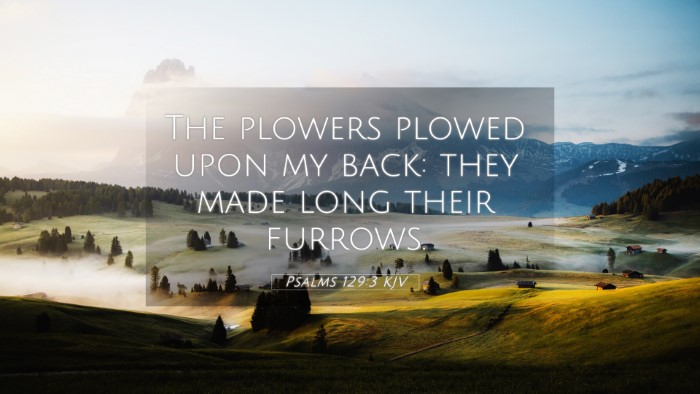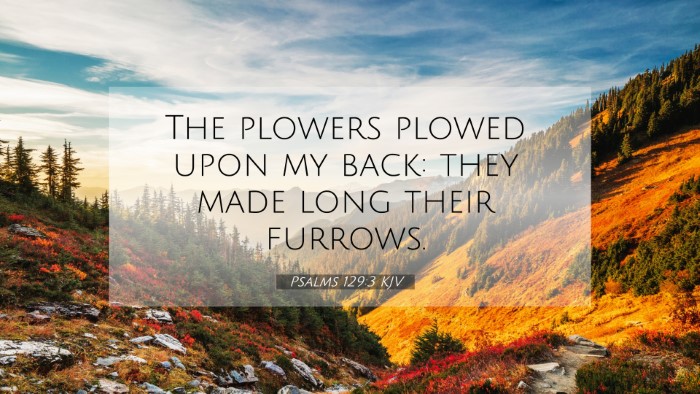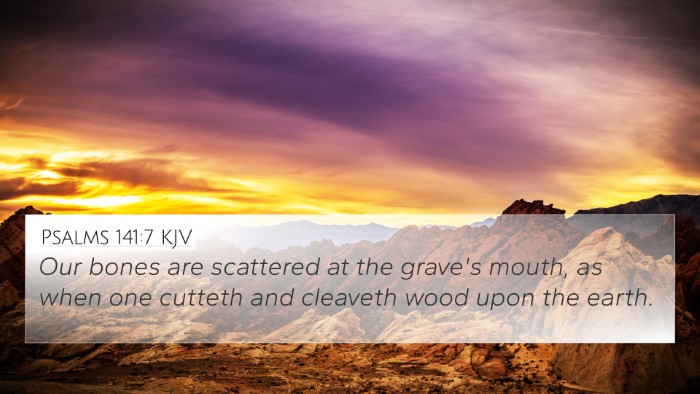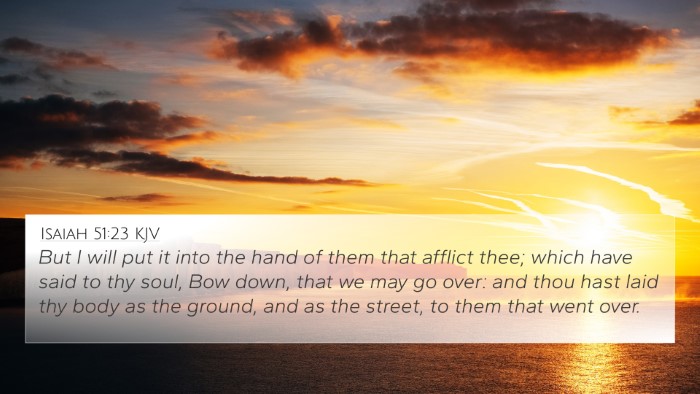Psalms 129:3 - Summary and Interpretation
Verse Text: "The plowers plowed upon my back: they made long their furrows."
Overview: Psalms 129 reflects the deep sufferings and afflictions of Israel throughout its history, while also expressing hope in God's ultimate justice and deliverance.
Meaning of Psalms 129:3
This verse uses the metaphor of plowing to describe the harsh treatment and oppression faced by the psalmist, representing collective suffering endured by the people of Israel. The imagery conveys a sense of enduring hardship but also highlights resilience.
Commentary Insights
-
Matthew Henry:
Henry interprets this verse as a symbol of the relentless afflictions faced by the people of God throughout their exile and trials. He suggests that the suffering described is not without purpose, as it ultimately leads to a greater dependence on God's redemptive power.
-
Albert Barnes:
Barnes emphasizes the agricultural imagery, noting that just as furrows are made in the soil, so too has the oppressor left their mark upon the back of the afflicted. However, the psalm assures believers that these trials are not the end, as God will bring justice.
-
Adam Clarke:
Clarke elaborates on the historical context, linking the verse to Israel's oppression by various enemies. He concludes that though they may face severe trials, the hope for deliverance remains through faith in God’s promises.
Bible Verse Cross-References
This verse is supported and enriched by the following cross-references:
- Lamentations 3:30: "Let him give his cheek to the smiter, and let him be filled with reproach."
- Isaiah 53:5: "But he was wounded for our transgressions, he was bruised for our iniquities: the chastisement of our peace was upon him; and with his stripes, we are healed."
- Matthew 5:11: "Blessed are you when people insult you, persecute you and falsely say all kinds of evil against you because of me."
- 2 Corinthians 4:8-9: "We are hard pressed on every side, but not crushed; perplexed, but not in despair; persecuted, but not abandoned; struck down, but not destroyed."
- Romans 8:17: "And if children, then heirs; heirs of God, and joint heirs with Christ; if so be that we suffer with him, that we may be also glorified together."
- Psalms 126:5: "They that sow in tears shall reap in joy."
- Hebrews 12:1: "Therefore, since we are surrounded by such a great cloud of witnesses, let us throw off everything that hinders and the sin that so easily entangles."
Thematic Connections
The thematic connections between this verse and others highlight the idea of suffering leading to resilience and ultimate redemption within the biblical narrative. The idea of enduring hardship is a common thread throughout both the Old and New Testament, illustrating a continuous dialogue on faith amidst tribulation.
Cross-Referencing Biblical Texts
To effectively study Psalms 129:3, one can utilize tools for Bible cross-referencing such as:
- Bible Concordance: A comprehensive index of words or topics found in the Bible, helping users locate relevant scriptures.
- Bible Cross-Reference Guide: These tools provide suggestions for relevant verses that share similar themes or messages.
- Cross-Reference Bible Study: This method of study involves examining verses in relation to each other to deepen understanding.
- Bible Reference Resources: Accessing various commentaries can illuminate connections between verses.
Conclusion
Psalms 129:3 serves not just as a statement of sorrow, but as an affirmation of faith in the midst of suffering. It encourages believers to trust in God’s timing and justice, reflecting the enduring nature of hope despite trials. By understanding the connections between this verse and others, one can gain a more comprehensive view of the biblical narrative surrounding suffering and redemption.




